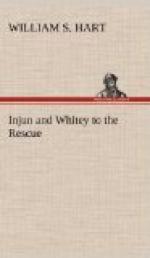And this is the Indian’s mode of fishing. He puts up a tepee right out on the ice, and puts a blanket inside the tepee. Then he cuts a hole in the ice, and lies down on the blanket and industriously watches the hole. You know that fish are very inquisitive, and when Mr. Inquiring Fish comes along to see about that hole, Mr. Indian spears him just back of the head, pulls him out, and has fried fish for supper.
When Whitey beat it down to the river, to show his boots to a new audience, he was followed by Injun and Sitting Bull. Trouble was following, too,—Harrowing Trouble,—but Whitey didn’t know it. On the frozen river were about a dozen tepees, standing up something like big stacks of cornstalks on a field of frosted glass. So there probably were about a dozen Indians, lying on their stomachs, watching as many holes in the ice.
There was not one of those Indians that Whitey thought should miss seeing those boots. In the first tepee his reception was very gratifying. Little Eagle was the owner’s name, and he didn’t care much about boots, but the decorations on these pleased his taste for the gaudy, and his eyes sparkled as he grunted his praise.
So it went around the little fishing village, until Whitey entered about the eighth tepee, and that was where Trouble was right next to him. Inside the tent it was dark. And Whitey didn’t fall into the hole in the ice—he walked into it. His life was not in danger, because he didn’t mind a little cold water, and the Indian lying there on his stomach, with his eyes accustomed to the darkness, could see, and he quickly grabbed Whitey by the shoulders and yanked him out—but, oh! the boots!
They were crinkled and soaked and water-logged and shrunken. And it took six Indians to get them off, two pulling on each boot, and two to hold Whitey. And when they were off, Whitey borrowed a pair of moccasins, and raced to the ranch house, with Injun and Sitting Bull.
Now, in the living-room of the Bar O ranch house in winter—and in every other ranch house in that part of the country—was a big stove that held a stick of cordwood three feet long. In fact, it held four or five such sticks of cordwood, which, you can imagine, made a good fire. And straight to this fire went Whitey. He was wet, and he was ashamed. And he put the boots under the stove to dry, without anybody’s seeing him. And he didn’t say anything to his father about it, because he was ashamed. And he went to bed without saying anything about it.
In the morning Whitey was up with the sun, and went to get his boots. And, oh, ye gods! Why didn’t the heavens fall? What once was a pair of proud boots, looked like two little, brown wrinkled apples! It was a tragedy in six acts. It was worse than that, for one can find words for a tragedy. But why dwell on it?
And while Whitey was getting the worst of the first, horrible shock, his father came into the living-room, and not knowing why, Whitey ran, and his father, not knowing why, I suspect, ran after him. Whitey was fleet of foot, and much smaller than his father, so he could make the stairs better. And he ran up and down and around, now slamming this door, and now slamming that one.




